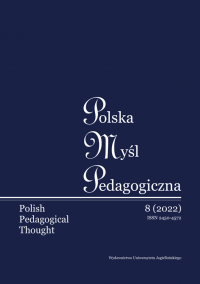Filozofia praktyczna w dorobku Sebastiana Petrycego jako jeden z filarów renesansowej koncepcji pedagogiczno-filozoficznej
Practical Philosophy in Sebastian Petrycy’s Output as One of the Pillars in the Renaissance Pedagogical-Philosophical Concept
Author(s): Agnieszka Michalkiewicz-GorolSubject(s): Philosophy, Education, Social Philosophy, History of Education, Pedagogy
Published by: Wydawnictwo Uniwersytetu Jagiellońskiego
Keywords: axiology; practical philosophy; Sebastian Petrycy of Pilsen; Renaissance pedagogical concept; democratization of upbringing
Summary/Abstract: This outline is an attempt to remember the work of Sebastian Petrycy of Pilsen – Polish Renaissance medical doctor, poet, philosopher and, first of all, a translator of Aristotle’s works to Polish, and the creator of native philosophical terminology within the field of practical philosophy, which in its autonomous pedagogical-philosophical concept, created while working on Stagirite’s works translation, constitutes an axis of the country’s reform on multiple fields. Sebastian Petrycy focussed on practical philosophy, which might have become available to every reader of Przydatki. The Arethological point of view seems to be the essential philosophical and pedagogical perspective for Sebastian Petrycy. Ethics is perceived as a science preparing for good life. Ethics is expected to teach good behaviour, abstaining from evil and supporting will with good manners. It’s worth highlighting the fact that the author of Przydatki believes the concept of arete houses the aspect of a social life’s democratization. Everybody, as Sebastian Petrycy of Pilsen claims, may earn the name of a noble man if they live virtuous lives.
Journal: Polska Myśl Pedagogiczna
- Issue Year: 8/2022
- Issue No: 8
- Page Range: 315-330
- Page Count: 16
- Language: Polish

